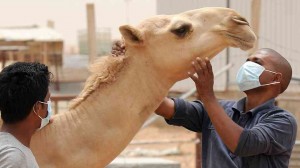Particles of the MERS (Middle East Respiratory Syndrome) virus have been found in the air of a barn that had housed an infected camel. The particles contained genetic fragments of the virus on all three days that the air was sampled.
The owner of the barn, a 43 year old male died of MERS in hospital in Jeddah, Saudi Arabia. In searching for the source of the virus the air in the barn was sampled. Sometime later one of the camels he tended was found to have the virus.
This raises issues about how much MERS needs to be in the air before it can be passed from person to person. The camel owner who died is not a good subject to assess this from because he was handling camels, a known vector of the disease, and he could therefore have caught it direct from the camel rather than from sharing air with the beast.
With the World Health Organization recording 701 deaths from MERS (up to June 16th), and with roughly a third of those cases proving fatal MERS going airborne is the last thing we need.
Sustained person to person transmission becomes the reality once the virus no longer needs the vector, in this case camels, to act as the intermediary host.
The findings show the need for “further investigations and measures to prevent possible airborne transmission of this deadly virus,” lead author Esam Azhar, said in a news release from the American Society for Microbiology. Azhar is the head of the Special Infectious Agents Unit at King Fahd Medical Research Center and associate professor of medical virology at King Abdulaziz University in Jeddah, according to the news release.
“This study also underscores the importance of obtaining a detailed clinical history with particular emphasis on any animal exposure for any [MERS] case, especially because recent reports suggest higher risk of [MERS] infections among people working with camels,” he added. (source)
Take Care
Liz
This article was originally published at Ready Nutrition™ on July 29th, 2014







